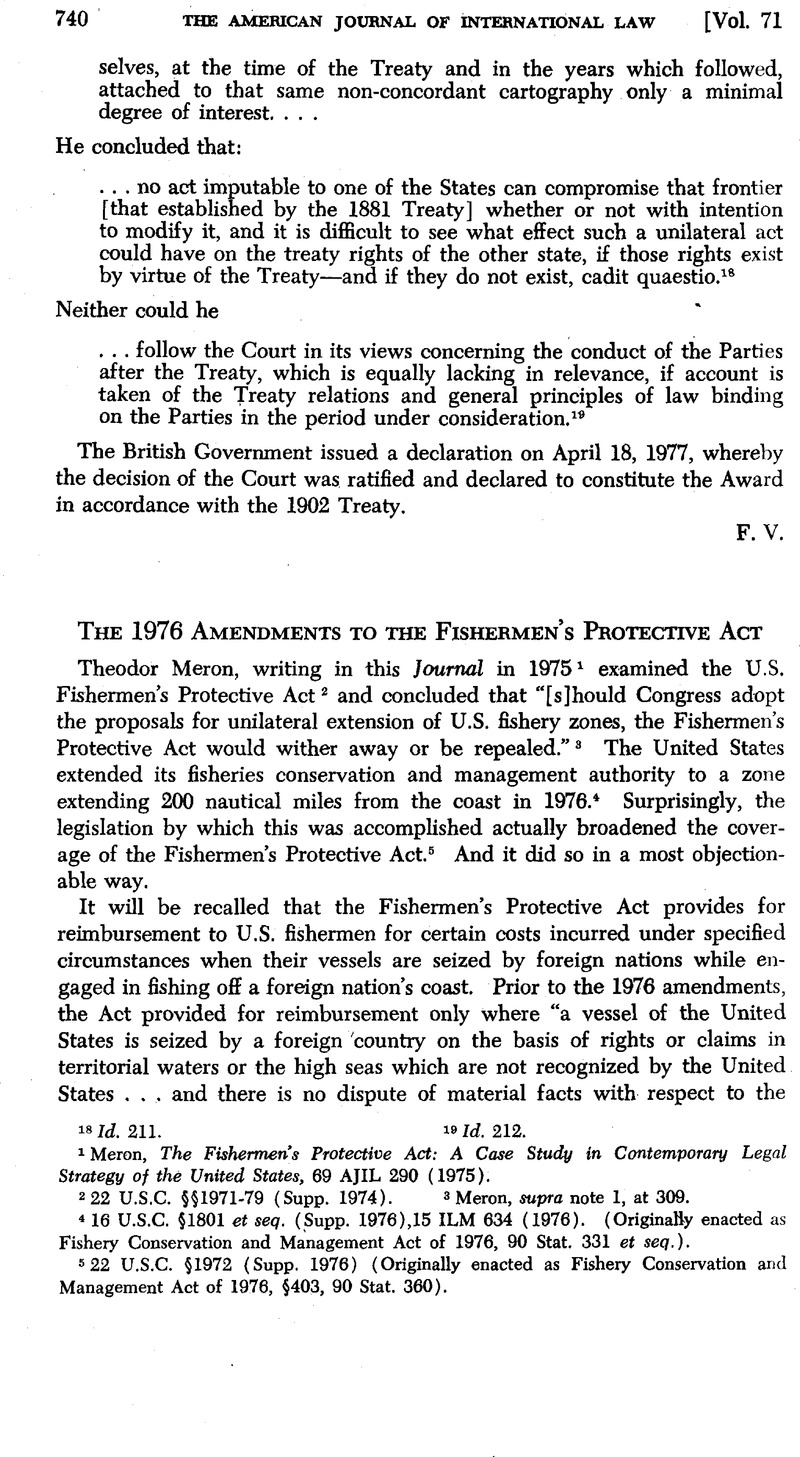No CrossRef data available.
Published online by Cambridge University Press: 27 February 2017

1 Meron, , The Fishermen's Protective Act: A Case Study in Contemporary Legal Strategy of the United States, 69 AJIL 290 (1975)CrossRefGoogle Scholar.
2 22 U.S.C. §§1971-79 (Supp. 1974).
3 Meron, supranote 1, at 309.
4 16 U.S.C. §1801 et seq.(Supp. 1976),15 ILM 634 (1976). (Originally enacted as Fishery Conservation and Management Act of 1976, 90 Stat. 331 et seq.).
5 22 U.S.C. §1972 (Supp. 1976) (Originally enacted as Fishery Conservation and Management Act of 1976, §403, 90 Stat. 360).
6 22 U.S.C. §1972 (1970).
7 22 U.S.C. §1973 (1970). The 1976 amendments also elaborated the meaning of “other direct charge” in this section by adding: For the purposes of this section, the term “other direct charge” means any levy, however characterized or computed (including, but not limited to, any computation based on the value of a vessel or the value of fish or other property on board a vessel), which is imposed in addition to any fine, license fee, or registration fee. Fishery Conservation and Management Act of 1976, §403, 90 Stat. 360.
8 22 U.S.C. §1975 (1970). The language “such action as he deems appropriate” leaves discretion with the Department of State as to whether an international claim should be pursued at all in any specific case. To construe the section as mandating an international claim would pose constitutional problems concerning congressional intrusion in the executive's exclusive power to conduct foreign affairs. SeeL. Henkin, Foreign Affairs And The Constitution 93 (1972). In light of the 1976 amendments to the Act, this is the only reasonable construction since some incidents that would result in reimbursement under the Act would not establish the basis for an international claim in any event. Indeed, it is questionable whether the United States should routinely notify a foreign government that reimbursements have been made in light of the discussion that follows.
9 Meron, supranote 1, at 299.
10 Mai. 14, 1975, TIAS No. 8253, 14 ILM 909 (1975) (effective Mar. 22, 1976).
11 Id.,Preamble.
12 SeeMeron, supranote 1, at 291.
13 Note 4, supra.
14 16 U.S.C. §1813 (Supp. 1976).
15 22 U.S.C. §1972 (Supp. 1976).
16 Fisheries Agreement with Mexico, Nov. 24, 1976, Preamble; Agreement with Brazil Concerning Shrimp, Mar. 1, 1977, Preamble, TIAS No. 8559 (effective May 1, 1977).
17 UN Doc. A/CONF.62/WP.8/Rev.1 (1976), Part II, Art. 61, para. 2.
18 Id.Art. 61, para. 3.
19 In this connection, it should be noted that U.S. law provides for imprisonment of foreign fishermen for violations of fisheries regulations. 16 U.S.C. §1859 (Supp. 1976).